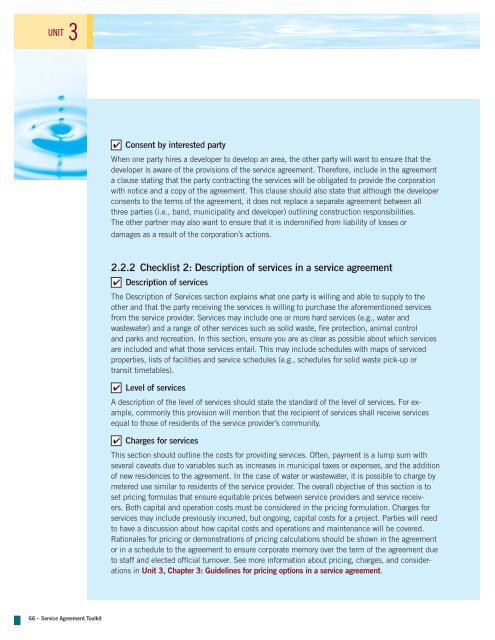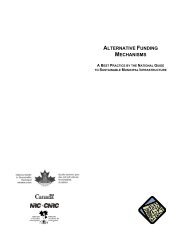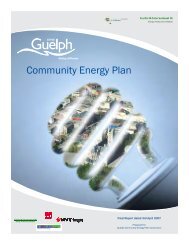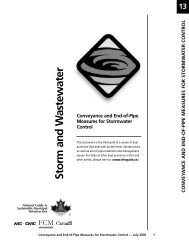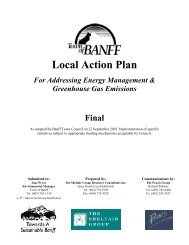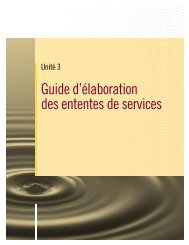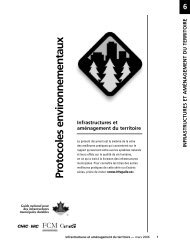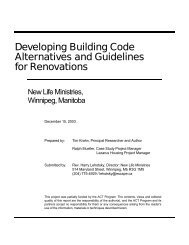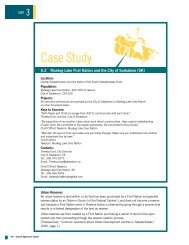Guide to Service Agreements - FCM
Guide to Service Agreements - FCM
Guide to Service Agreements - FCM
Create successful ePaper yourself
Turn your PDF publications into a flip-book with our unique Google optimized e-Paper software.
UNIT 3<br />
66 – <strong>Service</strong> Agreement Toolkit<br />
Consent by interested party<br />
When one party hires a developer <strong>to</strong> develop an area, the other party will want <strong>to</strong> ensure that the<br />
developer is aware of the provisions of the service agreement. Therefore, include in the agreement<br />
a clause stating that the party contracting the services will be obligated <strong>to</strong> provide the corporation<br />
with notice and a copy of the agreement. This clause should also state that although the developer<br />
consents <strong>to</strong> the terms of the agreement, it does not replace a separate agreement between all<br />
three parties (i.e., band, municipality and developer) outlining construction responsibilities.<br />
The other partner may also want <strong>to</strong> ensure that it is indemnified from liability of losses or<br />
damages as a result of the corporation’s actions.<br />
2.2.2 Checklist 2: Description of services in a service agreement<br />
Description of services<br />
The Description of <strong>Service</strong>s section explains what one party is willing and able <strong>to</strong> supply <strong>to</strong> the<br />
other and that the party receiving the services is willing <strong>to</strong> purchase the aforementioned services<br />
from the service provider. <strong>Service</strong>s may include one or more hard services (e.g., water and<br />
wastewater) and a range of other services such as solid waste, fire protection, animal control<br />
and parks and recreation. In this section, ensure you are as clear as possible about which services<br />
are included and what those services entail. This may include schedules with maps of serviced<br />
properties, lists of facilities and service schedules (e.g., schedules for solid waste pick-up or<br />
transit timetables).<br />
Level of services<br />
A description of the level of services should state the standard of the level of services. For example,<br />
commonly this provision will mention that the recipient of services shall receive services<br />
equal <strong>to</strong> those of residents of the service provider’s community.<br />
Charges for services<br />
This section should outline the costs for providing services. Often, payment is a lump sum with<br />
several caveats due <strong>to</strong> variables such as increases in municipal taxes or expenses, and the addition<br />
of new residences <strong>to</strong> the agreement. In the case of water or wastewater, it is possible <strong>to</strong> charge by<br />
metered use similar <strong>to</strong> residents of the service provider. The overall objective of this section is <strong>to</strong><br />
set pricing formulas that ensure equitable prices between service providers and service receivers.<br />
Both capital and operation costs must be considered in the pricing formulation. Charges for<br />
services may include previously incurred, but ongoing, capital costs for a project. Parties will need<br />
<strong>to</strong> have a discussion about how capital costs and operations and maintenance will be covered.<br />
Rationales for pricing or demonstrations of pricing calculations should be shown in the agreement<br />
or in a schedule <strong>to</strong> the agreement <strong>to</strong> ensure corporate memory over the term of the agreement due<br />
<strong>to</strong> staff and elected official turnover. See more information about pricing, charges, and considerations<br />
in Unit 3, Chapter 3: <strong>Guide</strong>lines for pricing options in a service agreement.


